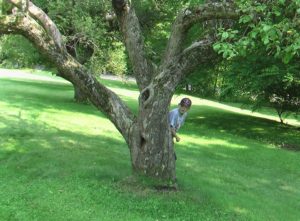 NURTURE YOUR IDEA. Perhaps it came in a snippet of dialogue, a scene, emotion or feeling. Like a seeds, stories germinate until they’re ready. Protect that young plant of a story so it can grow. What inner and outer obstacles does your character face? What conflicts? How will he or she or they grow/change? Finish your draft. Don’t share it too early–some critics, including you, the writer, might nip it at the roots. Cocoon it away from pests–set up a fence to keep out ‘rabbits,’ water, fertilize, keep writing.
NURTURE YOUR IDEA. Perhaps it came in a snippet of dialogue, a scene, emotion or feeling. Like a seeds, stories germinate until they’re ready. Protect that young plant of a story so it can grow. What inner and outer obstacles does your character face? What conflicts? How will he or she or they grow/change? Finish your draft. Don’t share it too early–some critics, including you, the writer, might nip it at the roots. Cocoon it away from pests–set up a fence to keep out ‘rabbits,’ water, fertilize, keep writing.
URGENCY is your friend bbecause it compels you to FINISH. But if you complete a too-hasty revision just to submit, urgency can become your enemy. Getting a novel published is difficult in the best of times. If you submit too early, you won’t be happy with the result. I know you think it’s done. But from personal experience, I’d wait a few weeks, then do another revision, which brings us to…
 REVISE until each character ‘sings.’ Be authentic. If you overwrite, cut the extras! Writing poetry has improved my novel writing. If you under-write, add ‘particular’ details. The key word is particular: not generalities that would keep your book bland. Use ALL your revision tools as you would your garden tools. You need to prune, shape, water, and fertilize. Read books on writing and craft, attend workshops, etc.. Ask opinions of a beta reader, target age reader, writing or reading friends you trust. Re-read your work aloud–a musician and fan of audiobooks, I can’t stress enough how much reading your work aloud helps–read it outside–on your porch, with your favorite beverage–as you read savor, pay attention, if warranted, take notes on what works and what doesn’t. ALSO listen to & read it on a kindle or nook–there is a voice on the electronic readers–maybe not the celebrity reader you envision, but a great help for revising. Your own voice is good, but listening to another voice is also good-you need both! Several revisions later, you may feel close. Reading on an electronic device really helps you catch things to revise when you see it in book format. It’s easier to see where you need to take out repetitive words, dump descriptions, or vary your usual sentence structures. On a kindle, in book format, you may see you begin too many of your paras the same way. Wherever you get an idea–take notes (on your phone or a tiny notepad–date them! Believe in your story–the more you believe the more your story will grow.
REVISE until each character ‘sings.’ Be authentic. If you overwrite, cut the extras! Writing poetry has improved my novel writing. If you under-write, add ‘particular’ details. The key word is particular: not generalities that would keep your book bland. Use ALL your revision tools as you would your garden tools. You need to prune, shape, water, and fertilize. Read books on writing and craft, attend workshops, etc.. Ask opinions of a beta reader, target age reader, writing or reading friends you trust. Re-read your work aloud–a musician and fan of audiobooks, I can’t stress enough how much reading your work aloud helps–read it outside–on your porch, with your favorite beverage–as you read savor, pay attention, if warranted, take notes on what works and what doesn’t. ALSO listen to & read it on a kindle or nook–there is a voice on the electronic readers–maybe not the celebrity reader you envision, but a great help for revising. Your own voice is good, but listening to another voice is also good-you need both! Several revisions later, you may feel close. Reading on an electronic device really helps you catch things to revise when you see it in book format. It’s easier to see where you need to take out repetitive words, dump descriptions, or vary your usual sentence structures. On a kindle, in book format, you may see you begin too many of your paras the same way. Wherever you get an idea–take notes (on your phone or a tiny notepad–date them! Believe in your story–the more you believe the more your story will grow.
TALENT’S a good start, but to make great art, you need talent joined with passion! Love the subjects you write about. Care: especially about your characters and their journeys, to get at the core and emotion. A good exercise? Send your character to a psychologist, psychiatrist or social worker. Play both roles yourself. Ask questions–ask him or her what is wrong, what is bothering them, what do they most wish for, long for, why are they upset, sad, angry, heartbroken, etc. At the heart of a great book is rhythm, instinct, poetry, and emotion. Open the door–see the ‘door’ in the tree above which is at Longwood Gardens, PA? Trust your instincts..Find your own voice. Remember, some novels take a long time to grow, like trees, with rings upon rings–keep believing, you’ll get there!
UNIFY YOUR VISION- Plot resolutions should come full circle, there’s a great book for screenwriting that also works especially when novel writers work on their revisions: Save the Cat. Helpful when you forget some loose plot threads. You will find you may have unconsciously, or consciously, put in certain symbols–rain, umbrellas, wells, tarot cards–you get my meaning–make sure they are sprinkled in where appropriate, meaningful, relevant. Your ending should echo your beginning and vice versa. Often the best beginnings are re-written after you have set your actual endings. Chapter outlines can help at the final stages, too–you can see if you spent more time than necessary on certain scenes, make further cuts, get sense of passing time–True art takes great effort. In a way, stories are like sketches– revised, drawn in your mind, imagined and re-imagined. Someone once said sketching a scene (even stick figures) can help you envision your story and write a better scene–Plus it’s a huge help when you are stuck to play with drawings, outlines, etc. Like a tree, prune your novel into the shape you want–but always save older versions. 
RENEW YOUR SPIRIT & FILL YOUR CREATIVE WELL. Spend time outside, or on favorite activities, and/or with those you love.Start a new project, take a vacation, seek inspiration in travels, new hobbies, volunteering, activities and hobbies, time with family & friends.
ENTERTAIN! Write to entertain yourself–or your younger self. Now you’ve nourished your novel as you would a flowering tree–or a bonsai, you are researching agents, publishers, making connections at conferences, and sending your book out. Have patience. But keep writing & believing. The more you enjoy your story, the more others will. Then that ‘new tree’ in your mind’s garden will offer readers shade, shelter, green beauty–and a new and wondrous book–one you can’t wait to climb into–just like your favorite tree. And maybe the unexpected. See the topiaries below? Who knows what’s around the corner?